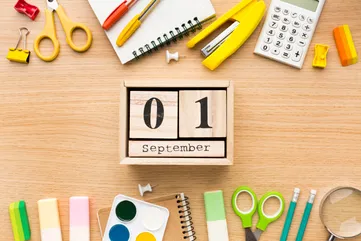Organization
Organization is your teen's ability to keep track of materials, information, and responsibilities in a way that actually helps them find things and meet deadlines instead of living in chaos.
Why organization can be a problem
Disorganization creates a domino effect of problems. Lost homework, missed deadlines, and forgotten materials lead to poor grades, stress, and conflict at home.
Common organization challenges:
• Backpack looks like a paper tornado hit it
• Can't find homework that was definitely completed
• Bedroom floor is the filing system
• Important papers crumpled at bottom of bags
• No system for tracking assignments
• Constantly losing phones, keys, or school materials
For teens with ADHD or executive function challenges, organization requires mental effort that their peers handle automatically. It's not laziness; it's like asking someone to write with their non-dominant hand all day.
You're not alone
If you've ever found a month-old permission slip crumpled in your teen's backpack or watched them frantically search for homework they swear they completed, you're not alone. Most teens struggle with organization as their lives become more complex but their executive function skills are still developing. The teenage brain prioritizes immediate rewards over future benefits, making organization feel pointless. Add in ADHD or learning differences, and organization becomes even more challenging. The key is finding systems simple enough to maintain consistently.
What it looks like day to day
Student
Your teen completes homework but gets a zero because they can't find it to turn in, despite spending 20 minutes searching through their disaster of a backpack.
Parent
You find important school papers being used as a bookmark, test review sheets as desk decoration, and yesterday's lunch still in their backpack from last week.
Tiny steps to try
Build simple systems that require minimal maintenance and work with your teen's brain, not against it.
- 1
One-touch rule
When touching a paper, immediately put it in its designated spot. No "I'll deal with this later" pile. Homework goes straight into the turn-in folder, not loose in the backpack.
- 2
Color coding everything
Assign each subject a color. Math is red: red folder, red notebook, red textbook cover. This visual system bypasses executive function demands.
- 3
Launch pad setup
Designate one spot for everything needed tomorrow. Backpack, sports gear, phone charger all live here. Morning scramble eliminated.
- 4
Sunday reset
Pick one day weekly to dump and reorganize the backpack, clean out folders, and prepare for the week. Make it routine with music or rewards.
- 5
Digital backup
Photo important papers immediately. Lost homework can be reprinted. This safety net reduces organization anxiety.
Why organization matters
Organization is foundational for academic success and adult functioning. It's not about being neat for neatness' sake; it's about creating external systems that support goal achievement when internal executive function is still developing.
Research shows that organizational skills predict academic achievement independent of intelligence. Students with better organization earn higher grades, experience less stress, and develop stronger self-efficacy. These skills become even more critical in high school and college when external structure decreases and self-management increases.
Ready to help your teen thrive?
Get personalized 1-on-1 coaching to build better habits and boost grades. Join 10,000+ families who trust Coachbit.
Frequently Asked Questions
Should I organize for my teen or make them do it alone?
Start with scaffolding: do it together, gradually transferring responsibility. Organize with them initially, teaching the system. Then supervise while they do it. Finally, check in periodically. Jumping straight to independence often fails because they lack the skills. Think of it like teaching driving: you don't hand over the keys immediately.
Why can my teen keep their gaming setup perfectly organized but not school materials?
Interest and immediate rewards drive organization. Gaming provides instant feedback and enjoyment, motivating organization. School materials offer delayed, abstract rewards that don't activate the same motivation. This is especially true for ADHD brains. The solution is making school organization as automatic and rewarding as possible through systems and external motivators.
Related Terms
ADHD (Attention-Deficit/Hyperactivity Disorder)
ADHD is a neurodevelopmental condition where the brain's executive function system works differently, affecting focus, impulse control, and activity levels in about 5-10% of children.
Executive Function
Executive function is your brain's management system that helps teens plan, focus, remember instructions, and juggle multiple tasks successfully.
Planning and Prioritization
Planning and prioritization are executive functions that involve organizing tasks, determining importance, and sequencing activities to achieve goals efficiently.
Time Management
Time management is the ability to plan, prioritize, and use time effectively to accomplish tasks and meet deadlines without constant crisis.
Working Memory
Working memory is your teen's mental sticky note that holds information just long enough to use it, like remembering instructions while doing homework or keeping track of their place in a conversation.
Related Articles

Finding Order in the Chaos – Setting up Calendars for Kids
Creating a calendar and daily schedule for kids can be beneficial to manage school, homework, extracurriculars and hobbies. Color-coding and time-blocking are helpful tools for kids with ADHD.
Read article
3 Ways an Executive Functioning Coach Can Help Your Child
Discover why executive functioning skills are crucial for your child's success. Learn how an executive functioning coach can make a difference
Read article
